#women of trachis
Text
Putting my text post hands to classical use
✨main characters in my working thesis on Greek tragedy: there’s a murder in the oikos✨

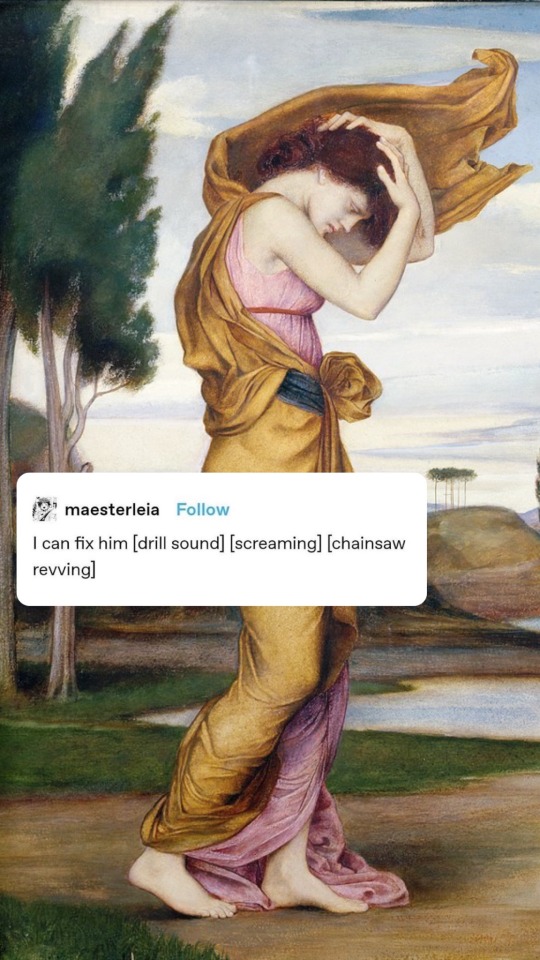

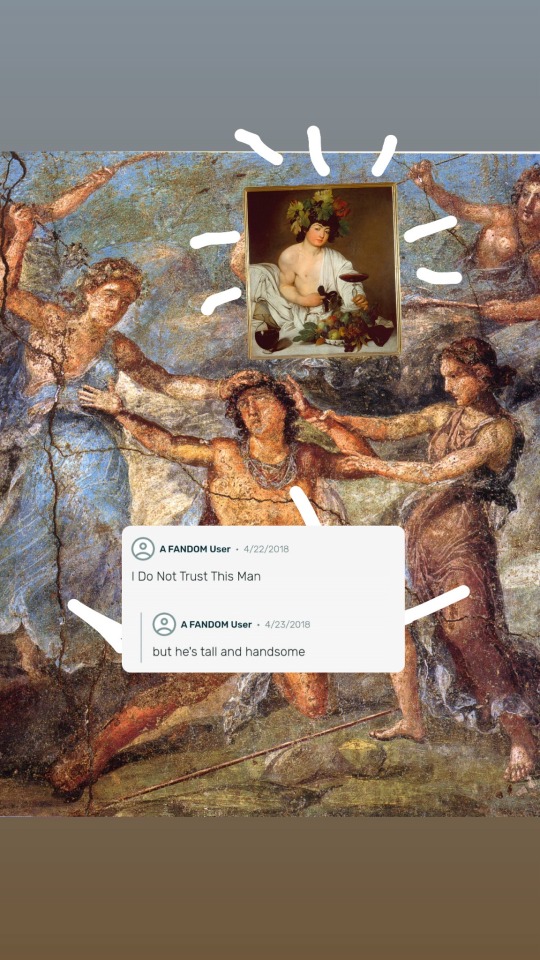

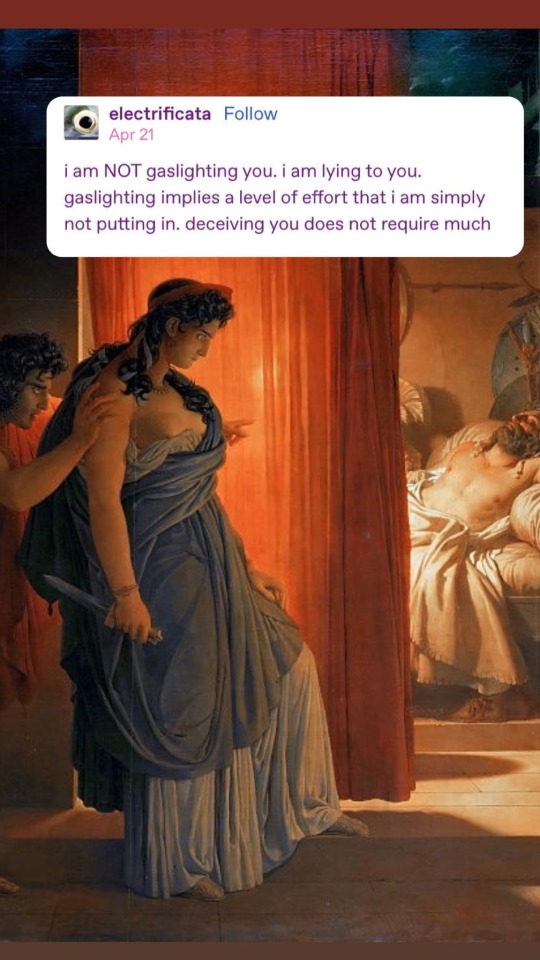
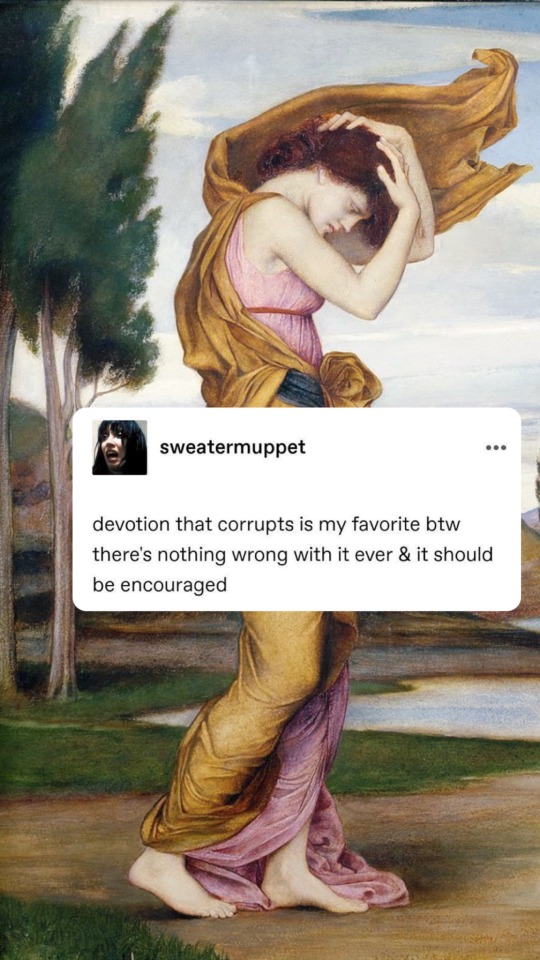

(pt2)
#tagamemnon#guess my special interest#Greek tragedy#classics#Medea#deianira#clytemnestra#cassandra#dionysus#pentheus#the bacchae#libation bearers#women of trachis#agamemnon#maenads#herakles#hercules#greek mythology#ancient greece#klytaemnestra#medeia#bakkhai#trakhiniai
101 notes
·
View notes
Text
ok so in women of trachis, sophocles asserts that deianeira killing heracles was an act of love, and an accident, and even implies that she was tricked into killing him by nessus. but like. she still killed her husband, earning her the name husband killer (or man killer, depending on how you translate). right? WRONG!
or at least. I think so.
so. yk how generally when people try to avoid a prophecy the prophecy just happens ever more fucked up? maybe this was another instance of that. before sophocles, the general consensus was just that deianeira was jealous, so she murdered her husband. but like. what if she knew that her fate was to kill him (I mean her name literally means man/husband killer), and was trying so hard not to, and was trying so hard to build their relationship back up, via the gift of a lovely coat aided by the centaur nessus, and oops! prophecy fulfilled
anyways I love women of trachis and also AUGHHH
#mine#women of trachis tag#classics tag#im only just getting into wot so tell me if im stating the obvious
2 notes
·
View notes
Text
WOMEN OF TRACHIS
Directed by Cheryl G. McFadden
Boston Globe, 1979

5 notes
·
View notes
Text
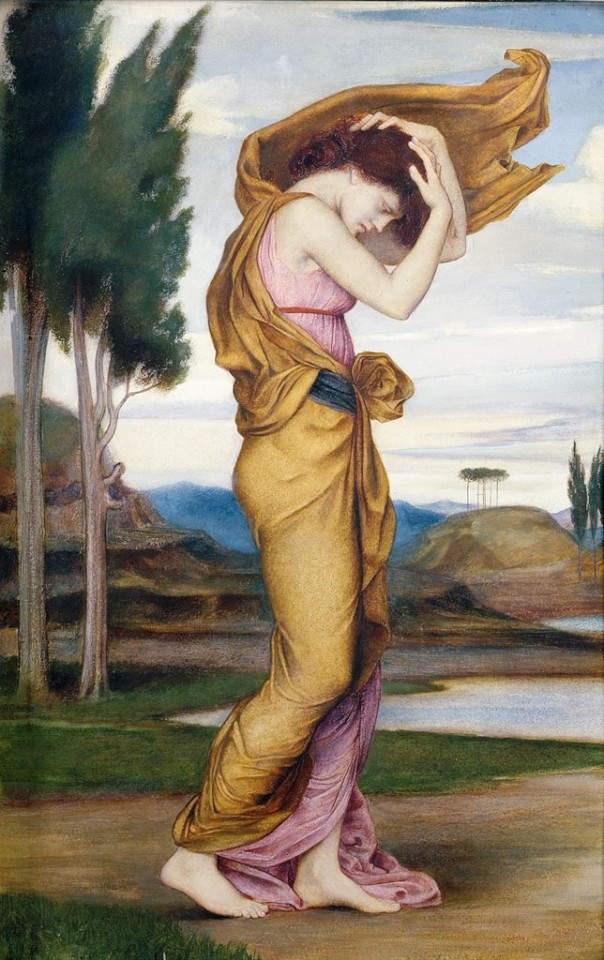
Deianira, Deïanira, or Deianeira also known as Dejanira, is a Calydonian princess in Greek mythology whose name translates as "man-destroyer" or "destroyer of her husband". She was the wife of Heracles and, in late Classical accounts, his unwitting murderer, killing him with the poisoned Shirt of Nessus. She is the main character in Sophocles' play Women of Trachis.
#Evelyn De Morgan#Deianira#Deïanira#Deianeira#Dejanira#greek mythology#women in mythology#paintings#art#arte
19 notes
·
View notes
Text
A fantasy read-list: A-1
Fantasy read-list
Part A: Ancient fantasy
1) Mythological fantasy (Greco-Roman)
The oldest form of fantasy in the history of mankind is, without a doubt, mythology. The roots of the modern fantasy genre are found in the old myths and legends of the Antiquity - and so this read-list will open with a few works of reference when it comes to mythology, the most famous texts covering the legends of old.
# The “founding duo”: Homer and Hesiod
These two poets form the oldest Greek mythological texts known to history, and together they created the basis on which classical Greek mythology formed itself (though Hesiod and Homer had conflicting mythology, with numerous differences in pantheons, relationships and cosmogonies, resulting in an “Homeric” Greek mythology - older and more archaic - and an “Hesiodic” Greek mythology - the most famous and widespread one, the “classical” pantheon).
Homer’s Iliad and Odyssey, the two greatest epics of Ancient Greece, and the two works from which the epic genre originally defined itself. The Homeric Hymns were probably not written by Homer himself, just written in his style, but they are also a series of mini-epics each depicting the greatest adventures and most famous legends of the Greek gods.
Hesiod’s Theogony is the cosmogony of Ancient Greece, and the creation legend of its mythology. He also collected/wrote several Greek myths in his Works and Days.
# Callimachus’ Aetia (a poem explaining the mythological origins of rites, cults and worships, in the style of the Theogony) and Hymns (hymns to the god in the style of the Homeric Hymns)
# Apollonius’ Argonautica. Another famous Greek epic, and the main source of information for the myth of Jason, Medea and the Argonauts.
# The trio of famous Ancient Greece tragedy playwrights. Aeschylus, author of Prometheus Bound, the Seven Against Thebes, and the Oresteia trilogy (Agamemnon, The Libation Bearers, The Eumenides). Sophocles, with his Theban trilogy (Oedipus-Rex, Oedipus at Column, Antigone) and other plays such as Ajax or the Women of Trachis. Euripides, famous for his Medea, Hippolytus, Alcestis, Herakles, Iphigenia in Tauris, The Bacchae and many more...
Plus, in a different genre, Artistophanes, the “father of comedy” or “prince of comedy”: The Birds and The Frogs are his most mythological plays, though other classics of his include The Clouds, The Wasps or Lysistrata...
# The fourth volume of Diodorus Siculus’ “Bibliotheca historica”, which is a true encyclopedia of all the Greek myths and legends Diodorus could find.
# The “founding duo” of Roman myths: the Roman equivalent of Hesiod and Homer, with works just as influential as them.
Virgil, who with his Aeneid formed a “sequel” to Homer’s Iliad and created the greatest Roman epic of history - he also collected/rewrote several myths in his Bucolics and Georgics.
Ovid’s Metamorphoses is the other main piece of literature that defined Ancient Roman literature and mythology as a whole, and for the longest time in Europe it stayed the main source of information about Greco-Roman mythology - to the point Ovid’s Metamorphoses was much more well-known than Hesiod or Homer’s own works. Other works of his with mythological tales include his Ars Amatoria and his Fasti.
# Titus Livius’ “Ab urbe condita”, a work containing the history of Rome, but opening with the myths and legends concerning the foundation of this city.
# Antoninus Liberalis’ Metamorphoses, the lesser-know “twin” of Ovid’s own Metamorphoses.
# Hyginus’ Fabulae and De Astronomica. Compilation of myths and legends told with a scientific mind.
# Apuleius’ The Golden Ass. A strange, bizarre, mystic and comical novel of late Ancient Rome, which contains the most famous version of the legend of Psyche and Cupid.
# The works of Lucian, another author of late Antiquity. Highlights include The Dialogues of the Gods, a parody of the Homeric epics and mythology ; Lover of Lies, which contains the earliest version of “The Sorcerer’s Apprentice” tale ; and A True Story, considered by many to be the earliest work of sci-fi.
# The Orphic Hymns, and the Orphic Argonautica, the two main texts informing us about the “Orphic religion”, a mystery cult with its own mythology, cosmogony and beliefs completely separate from the “classical” Greek mythology of Hesiod/Homer.
# Nonnus’ famous Dionysiaca, the last of the great mythological epics of Antiquity, written by a very, VERY late Greek author (we are talking of a post-Roman era author, living in an early-Christianized Greece).
#read-list#fantasy#fantasy read-list#mythology#greek mythology#roman mythology#book resource#resources#book references#references
33 notes
·
View notes
Text
Pointless poll time. In lieu of the traditional 50,000-word novel project this November, I've been thinking I might do a verse translation of a Sophocles play and post the occasional excerpt here. If I were to do that, which of his extant plays would you be most interested in seeing translated?
15 notes
·
View notes
Text
Ancient Woman Thunderdome 2023
Round 1 Match 18: Helen vs. Deianeira!
The rules: Vote based on who would win in a fight, NOT who you like more. Consider factors such as physical prowess, intelligence or cunning, and magical ability.
If the character has multiple non-godly forms, consider the one you believe to be more powerful. If the character is a goddess for a portion of their life, please only consider their mortal or non-godly form.
The fighters:
Fighter: Helen
Source(s): Euripides' Helen, Homer's Iliad and Odyssey, various other mythological sources
Bio: Helen, the most beautiful woman in the world, hatched from an egg. When she was old enough to be married, many suitors showed up, and Helen's father was afraid of conflict; therefore, before any of them could be chosen as her husband, they swore an oath to defend whichever of them was chosen against any attempt to contest the marriage. This came in handy when, years later, Aphrodite promised Paris the most beautiful woman in the world, and Paris came and took Helen from her husband, Menelaus. Greek armies assembles, and ships sailed to Troy to win her back. Most writers disagree on her motives, actions, and even location during this time, but Homer says that she tried to get the Greek soldiers in the Trojan horse to reveal themselves by circling the horse and imitating their wives.
Fighter: Deianeira
Source(s): Sophocles' Women of Trachis, various other mythological sources
Bio: Deianeira's name translates to "husband-destroying." She was married to Heracles. At one point, a centaur named Nessus tried to rape her, but Heracles killed him with a poisoned arrow before he could. As Nessus died, he told Deianeira that a bit of his blood mixed with the poison from Heracles' arrow would stop Heracles from cheating on her. Deianeira dyed a robe with the blood and sent it to Heracles; when he put it on, it turned out it was poison, and he died painfully. Once she realized what she'd done, Deianeira killed herself.
10 notes
·
View notes
Text

11 Works, Artists' Interpretations of Hellenic legends, The Rape of Deianira, with footnotes #188
Deianira, Deïanira was a Calydonian princess in Greek mythology whose name translated as "man-destroyer" or "destroyer of her husband". She was the wife of Heracles and, in late Classical accounts, his unwitting murderer, killing him with the poisoned Shirt of Nessus. She is the main character in Sophocles' play Women of Trachis…
Please follow link for full post
Coypel,Paintings,Veronese,RELIGIOUS ART,PÉCHEUX,Centaur,Nessus,Roman,biography,Hercules,mythology,religion,Dejanira,Zaidan,Hellenic,GOSSART,Olympian,footnotes,
Hellenic #Roman #Zaidan #Mythology #Religion #biography #Paintings #Art #History #footnotes #Olympian #fineart
#Hellenic#Roman#Zaidan#Mythology#Religion#biography#Paintings#Art#History#footnotes#Olympian#fineart
7 notes
·
View notes
Text
Check out sophocles’s women of trachis when you get a chance. Sound of the summer
5 notes
·
View notes
Note
Do you have a favourite of the Sophocles you have read so far? I really like his Elektra and Women Of Trachis.
I love elektra
It's like the distilled peak of his traumatized broad material
2 notes
·
View notes
Text
EXCLUSIVE: Decker Sadowski (Brooklyn Nine-Nine) and Shane West (ER, The Dirty South) are set to star in Katherine Dudas’ horror comedy Theater Is Dead. The film is also written by Dudas (Waking Up Worried), Sadowski, Olivia Blue (This Game’s Called Murder) and Madison Lawlor (Casa Grande).
Production for the film recently wrapped on Vashon Island, WA.
Theater Is Dead is inspired by the all-too-common experience of being an artist taken advantage of by a mentor, and what it means to turn that trauma into female rage. The story follows sheltered Willow (Sadowski), who meets mysterious theater director Matthew Malvaggio (West) when he comes to the isolated island where she lives. She auditions for his play — a modern adaptation of Sophocles’ Greek tragedy Women of Trachis — and books the lead role. This launches Willow on a journey of self-discovery under Matthew’s tutelage, as she ignores dangers lurking in the shadows to get closer to her dream.
Source: DEADLINE.com
1 note
·
View note
Text
autism test tomorrow!!!
#mine#its literally gonna be six hours like. all you have to do is let me talk about deïanira in women of trachis and you will#diagnose me within two minutes. anyways. me when deïanira means man killer/ husband killler. except that wot presents it as an accident#augh sophocles my beloved
1 note
·
View note
Text
@faggot-loser tagged me hehe
Last song i listened to:
Self Esteem - The Offspring
Currently reading:
Medea - Euripides
Women of Trachis - Sophocles
Aristotle and Dante dive into the water of the world - Benjamin Alire Saenz
Miraculous Manga vol 1
A Silent Voice Manga vol 2
Current watching:
(rewatching) Malcolm in the Middle
Buzzfeed unsolved with a friend (@faggot-loser) i am loving it
(rewatching) The Amazing World of Gumball - im gonna have to restart rewatching bc i wanna watch with my friend
Young Royals
Percy Jackson - have to wait until spring break to finish it with my dad
Here are my serializd and letterboxd
Currently obsessed with:
Sidney Crosby (WOOOFFFF WOOOFFFF WOOOFFFF)
Spider-Man
Miraculous
Epic Mickey
Malcolm in the Middle
Batman & Robin
I dont have anyone to tag that hasnt been tagged LMAO
0 notes
Text
The formal irruption of tragedy into the elegiac texture directs us to the Sophoclean model — only to discover that the Deianira of the "Women of Trachis' utters no lament, either for Hercules or for herself. With an exceptional dramatic solution, she vanishes wordlessly (Trach. 813) from the scene and immediately kills herself on the marriage bed. Ovid has his Deianira speaking in this blank of the Sophoclean model. The Ovidian refrain "What is keeping you from dying, Deianira" sounds like an implicit self-reproach - not only because she is crushed by shame and guilt, but because by her delay she is swerving from the path laid down by the official model for this letter, the Trachiniae. Once again we see, and I shall come back to this later, how intertextual irony could be linked to a kind of self-referentiality. The text sees its future reflected in the mirror of its model, and at the same time sends its reader backwards to that model.
—barchiesi, "future reflexive", 342
#i'm obsessed with how very ovid this is#like. this is Peak Ovid Behavior.#future reflexive (barchiesi)#mea res
1 note
·
View note
Text
Award winning Sophocles and Italian history film programs on SACCO & VANZETTI for 2022-23 by ArtsPRunlimited, Inc. - World News Report
Award winning Sophocles and Italian history film programs on SACCO & VANZETTI for 2022-23 by ArtsPRunlimited, Inc. – World News Report
With Ellen Lanese
Paris and Sophocles too
Film Festival Selection in France Logo for 2020.
Community outreach for DEATH OF HERCULES and SACCO & VANZETTI: BURN !!!
Now we need venues to host us.
NEWARK, NEW JERSEY, UNITED STATES, July 18, 2022 /EINPresswire.com/ — New programs for 2022/23
The Death of Herakles
Sophocles’ THE WOMEN OF TRACHIS becomes DEATH OF HERCULES.
Our Award winning short…

View On WordPress
0 notes
Text






Who would have thought heracles would give us such top relatable content
247 notes
·
View notes